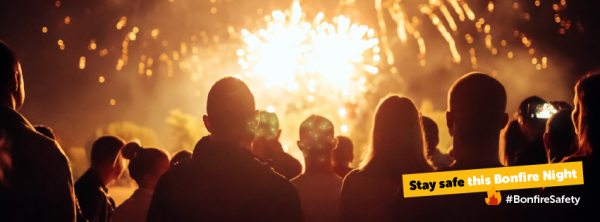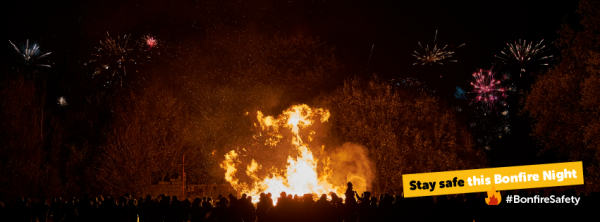We’re reminding the public ahead of any Bonfire Night celebrations to be aware of safety around fires and fireworks with issued advice on how to treat some of the more common injuries which occur at this time of year.
While our volunteers will be keeping the public safe at organised firework events across Wales, injuries are much more likely to occur at private parties, where trained volunteers won’t be on hand to help.
Everyone can be prepared to help in a firework first aid emergency by using some basic first aid skills.
If you’re organising a fireworks display, however big or small, you need to ensure you have a first aid kit close by – just in case!
Make sure you know what to do if someone suffers an injury during the fireworks season. Follow our advice below on how best to treat basic fire and firework related injuries:
Firework First Aid
Children under five should not use sparklers.
Sparklers can reach 2,000°C – more than 15 times the boiling point of water.
- Ensure you always wear gloves when handling sparklers
- Light one sparkler at a time
- South Wales Fire and Rescue Service advise you shouldn't dress in loose or flowing clothes as they may catch light
- Hold sparklers at arm’s length and away from the body
- Always put sparklers into a bucket of cold water afterwards
- Always supervise children when they are using sparklers and children under five should not use them

Burns or scalds
Burns are the most common injuries at fireworks displays. People often pick up sparklers at the wrong end or even come into contact with lit fireworks.
If someone has a burn or scald:
- Move the person away from the heat
- Place the burn or scald under cool running water for 10 minutes minimum. If water is not available, any cold, harmless liquid, such as milk or canned drinks, can be used
- If the burn is to a child, larger than your hand, on the face, hands or feet, or is a deep burn, call 999
- Gently remove any constricting clothing or jewellery before the injured area begins to swell. DO NOT remove clothing if it has stuck to the burn
- Once cool, cover the burn with kitchen film or place a clean plastic bag over a foot or hand. Apply lengthways, not around the limb, because the injured area may swell. If you do not have kitchen film use a sterile dressing or a non-fluffy pad and bandage
- DO NOT apply creams or oils, or pop blisters
- Monitor and treat for shock if necessary
- Severe burns (large and/or deep) and all burns to infants should be checked by a doctor

Debris in the eye
All eye injuries are potentially serious because of the risk to the casualty's vision.
If someone has something in their eye:
- Tell them not to rub it, so they don’t make it worse
- Pour clean water over their eye to wash out what’s in there and/or to cool the burn
- If this doesn’t work, try to lift the debris out with a damp corner of a clean tissue
- If this doesn’t work either, don’t touch anything that’s stuck in their eye – cover it with a clean dressing or non-fluffy material
- Then take or send them straight to hospital
Smoke inhalation
Symptoms of smoke inhlation may include a cough, shortness of breath and eye irritation.
If someone has inhaled smoke fumes:
- Move them away from the smoke so they can breathe in some fresh air
- Help them sit down in a comfortable position and loosen any tight clothing around their neck to help them breathe normally
- If they don’t recover quickly, call 999/112 for an ambulance
For more information about first aid courses call us on: 0345 678 5646.
The Royal Society for Protection of Accidents has shared its top tips for a safer fireworks party:
- Plan your firework display to make it safe and enjoyable, and ensure it finishes before 11pm
- Only buy fireworks which carry the CE mark, keep them in a closed box and use them one at a time
- Read and follow the instructions on each firework using a torch if necessary
- Light the firework at arm's length with a taper and stand well back
- Keep naked flames, including cigarettes, away from fireworks
- Never return to a firework once it has been lit
- Don't put fireworks in pockets and never throw them
- Direct any rocket fireworks well away from spectators
- Never use paraffin or petrol on a bonfire
- Make sure that the fire is out and surroundings are made safe before leaving
-Ends-
